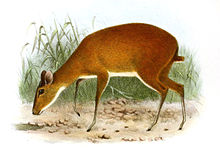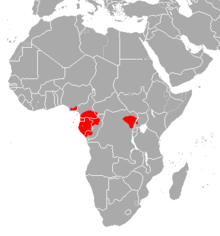| Bates’s pygmy antelope | |
|---|---|

| |
| Conservation status | |
 Least Concern (IUCN 3.1) | |
| Scientific classification | |
| Domain: | Eukaryota |
| Kingdom: | Animalia |
| Phylum: | Chordata |
| Class: | Mammalia |
| Order: | Artiodactyla |
| Family: | Bovidae |
| Genus: | Nesotragus |
| Species: | N. batesi |
| Binomial name | |
| Nesotragus batesi (De Winton, 1903) | |

| |
| range | |
| Synonyms | |
| |
Bates's pygmy antelope (Nesotragus batesi), also known as the dwarf antelope, pygmy antelope or Bates' dwarf antelope, is a very small antelope living in the moist forest and brush of Central and West Africa. It is in the same genus as the suni.
Description
Adult antelope weigh about 2 to 3 kg (4.4 to 6.6 lb), and are 50 to 57 cm (20 to 22 in) long, with a tail length of 4.5 to 5.0 cm (1.8 to 2.0 in). Only males have horns, about 3.8 to 5.0 cm (1.5 to 2.0 in) long. Their coat is shiny dark chestnut on the back and lighter toward the flanks. Male antelope are generously bigger than females.
Distribution and habitat
Bates pigmy antelope is native to tropical Central Africa. The range is separated into three distinct areas; southeastern Nigeria; the lower part of the Congo Basin; and northeastern Democratic Republic of Congo extending into western Uganda. Its typical habitat is humid lowland forest where it favours dense undergrowth. It also inhabits plantations, secondary forest, cleared areas and areas round human habitations.
Ecology
Bates's pygmy antelope eat leaves, buds, shoots, fungus, grass, and herbs. They also eat crops, which makes them unpopular with farmers. They are often caught in snares near agricultural fields. They have a typical territory of 2 to 4 ha (4.9 to 9.9 acres). Males are territorial, marking their territory with scent produced in the preorbital glands. Females are friendlier with each other and sometimes live in small groups. They bark when fleeing. Most pygmy antelope mate at late dry and early wet seasons. Gestation period is 180 days. One young is born per pregnancy. The fawn weighs between 1.6 and 2.4 kg (3.5 and 5.3 lb).
Status
Bates's pygmy antelope are not endangered although they are facing habitat loss; the expansion of human population has a negative effect on future population. In general, they are able to adapt to secondary forest, plantations, roadside verges and village gardens. Although not hunted commercially, this antelope is hunted for bushmeat in limited numbers.
References
- ^ IUCN SSC Antelope Specialist Group (2016). "Neotragus batesi". IUCN Red List of Threatened Species. 2016: e.T14603A50190946. doi:10.2305/IUCN.UK.2016-1.RLTS.T14603A50190946.en. Retrieved 3 December 2023.
- The New Encyclopaedia of Mammals D MacDonald 2002 Oxford ISBN 0-19-850823-9
- ^ Jonathan Kingdon; David Happold; Thomas Butynski; Michael Hoffmann; Meredith Happold; Jan Kalina (2013). Mammals of Africa. A&C Black. p. 208. ISBN 978-1-4081-8996-2.
External links
| Taxon identifiers | |
|---|---|
| Neotragus batesi | |
- IUCN Red List least concern species
- Dwarf antelopes
- Fauna of Central Africa
- Mammals of Cameroon
- Mammals of the Central African Republic
- Mammals of the Republic of the Congo
- Mammals of the Democratic Republic of the Congo
- Mammals of Equatorial Guinea
- Mammals of Gabon
- Mammals of Uganda
- Mammals of West Africa
- Mammals described in 1903
- Taxa named by William Edward de Winton